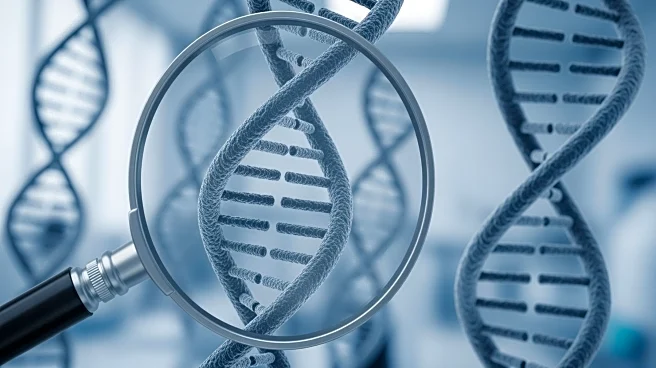What's Happening?
A comprehensive genetic study conducted by researchers from the University of Edinburgh and the Max Planck Institute has identified new genetic loci associated with dyslexia. The study, published in Translational
Psychiatry, analyzed genetic data from over 1.2 million individuals, revealing 13 novel genetic regions linked to dyslexia. Dyslexia, affecting 5-10% of the global population, is largely hereditary, but the specific genetic variants have been elusive. The research aims to enhance understanding of dyslexia's biological underpinnings and reduce stigma by highlighting its genetic basis. The study also explored the potential of using genetic scores to predict reading difficulties and examined ancient DNA to assess evolutionary changes related to dyslexia.
Why It's Important?
This study represents a significant advancement in the understanding of dyslexia, a common learning difficulty. By identifying specific genetic regions, researchers can better understand the biological processes involved in reading and writing challenges. The findings could lead to improved diagnostic tools and early intervention strategies, potentially benefiting educational systems and individuals with dyslexia. Additionally, the research may contribute to reducing stigma by framing dyslexia as a genetically influenced condition rather than a purely educational or cultural issue.
What's Next?
The study's findings may pave the way for further research into the genetic basis of dyslexia and related reading difficulties. Future studies could focus on developing genetic tests to identify individuals at risk, allowing for earlier and more targeted interventions. The research community may also explore the implications of these genetic discoveries for other neurodevelopmental conditions, such as ADHD and autism, which share some genetic overlap with dyslexia.
Beyond the Headlines
The study's exploration of ancient DNA suggests that dyslexia-related genes have not been subject to significant evolutionary pressures, indicating that societal changes have not drastically influenced these genetic traits. This insight could lead to broader discussions on the role of genetics in learning differences and the importance of accommodating diverse learning needs in educational settings.










